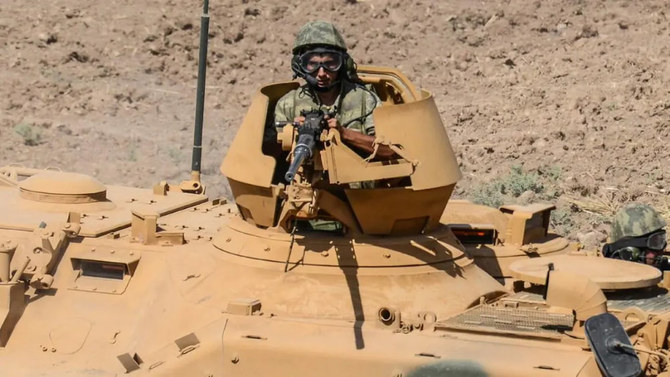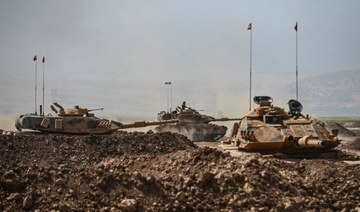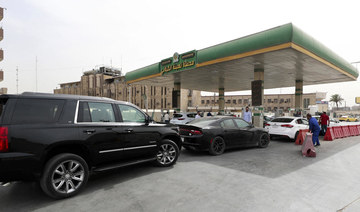ANKARA: Turkey has begun the new week with the launch of a large-scale ground and aerial cross-border offensive against Kurdish militants in northern Iraq.
Alongside artillery, T129B helicopters, drones and F-16 fighters, Turkey’s Special Forces and elite commando units were also deployed as part of the campaign that reportedly struck targets of the Kurdistan Workers’ Party, or PKK, in northern Iraq’s Metina, Zap and Avashin-Basyan regions.
The cross-border action, named Operation Claw Lock, came a day after Turkey’s Minister of Interior Suleyman Soylu said: “We will save Syria and Iraq from the hands of the US and Europe, and bring peace there.”
For Zaed Ismail, member of the scientific committee of the Istanbul-based Academy of International Relations, the operation is related to increased missile strikes against the Turkish base in Zilikan in Nineveh, and the PKK’s expansion in northern Iraq deep into Sinjar. It is also linked to recent political contact between Ankara and Irbil.
Turkish President Recep Tayyip Erdogan recently met with Masrour Barzani, the prime minister of Iraq’s Kurdistan regional government in Irbil.
Experts have noted that Sinjar is turning into an alternative headquarters for the PKK.
“The military operations began about a week after the visit of Barzani to Ankara and it clearly indicated the existence of security coordination between Irbil and Ankara to launch the military operation,” Ismail said.
Ismail said the PKK “began posing an increased existential threat to the political stability of the entire geography of northern Iraq, with repeated missile attacks on Irbil Airport.”
The offensive was carried out in coordination with Turkey’s “friends and allies,” the Defense Ministry stated.
But, for Ismail, it is difficult to resolve the battle through airstrikes, unless the international conditions are created for a broad ground operation.
The operation, which began at midnight, was launched as Russia showed no letup in its invasion of Ukraine, while Turkey’s mediation role was welcomed by Western partners.
Both the US and the EU have already designated the PKK as a terror group.
Tuna Aygun, an Iraq expert at Ankara-based think tank ORSAM, said the latest operation took place as part of a previous offensive, but this time Turkey was targeting runaway elements of the PKK from the eastern and western parts of the region.
“The operation area (had been) a shelter for the PKK militants for some time. Especially since 2017, (the) PKK mostly concentrated its logistical and military strength in Iraq to hit targets in Turkey,” he told Arab News.
“By establishing temporary military bases, Turkey aims at establishing its control on the transit routes of the militants according to the geographical characteristics of the territory,” said Aygun.
However, it is still unclear how long the military operation will endure and whether the movements of the PKK militants will be restricted.
“It will not be a one-day operation. But with the increased use of armed drones during such offensives, these moves do not depend any longer on the clim(actic) conditions,” Aygun said. He added that Turkey’s latest operation has the support of Baghdad and Irbil because it is being seen as a way to stabilize a region where thousands of civilians were displaced in recent years due to the PKK’s presence.
Ahead of the upcoming elections next year, this operation is also likely to have domestic repercussions in Turkish politics in the eyes of nationalist voters, and used as a trump card against the opposition pro-Kurdish Peoples’ Democratic Party.
Yerevan Saeed, research associate at the Arab Gulf Institute in Washington, said Turkey has been seeking to build a security zone inside the Kurdistan region for a number of years.
“The military operation appears to be deeper and more intense this year,” he told Arab News.
Its objectives are likely to include seizing control of strategic areas of Afashin, Matin, Khukuk and Zab. “(The) Turkish military has failed to control them in the past,” he added.
“If successful, Ankara will be able to separate Qandil mountains where PKK bases are located from (the) Rojava and Sinjar areas, (restricting the) PKK’s movements.”
Ali Semin, an expert on Iraqi politics from Nisantasi University in Istanbul, said the offensive is part of a series of operations since 2019 to create a buffer zone between its border with Northern Iraq and PKK-dominated areas.
“Ankara seems to seize the best political opportunity to expand its operation,” he told Arab News.
“The leadership in Baghdad and Irbil consider the latest activities of the PKK as an intervention (to) their political presence,” said Semin.
“Unlike the past operations of Turkey that were criticized by Iraqi authorities as a violation of their territorial sovereignty, Turkey’s current operation mostly (have) their backing,” said the expert.
Over the last three decades, Semin said, about 250 villages had been evacuated in northern Iraq. This was also where fighting in the past few years has intensified between Peshmerga forces loyal to the Kurdistan Democratic Party and the PKK.
According to Noah Ringler, an expert from Georgetown University, the offensive has received military support from the Turkish-aligned KDP Peshmerga and comes amid ongoing challenges with government formations in Baghdad, where Turkish officials now believe they have broad support from political parties for the operation.
“The goals of the operation likely include new Turkish operations posts closer to the PKK’s strategic strongholds near Qandil mountains, which holds political significance in Turkey, as well as disruption of PKK operations and influence in the region, and the strengthening of Kurdish and Iraqi political actors aligned with Turkey,” he told Arab News.
Experts also note that the success of such operations will also influence local dynamics in Syria.
“(The) Kurdish People’s Protection Units are mostly supported logistically and militarily by the PKK bases in Sinjar,” Semin said.
Baghdad and Irbil reached a security and administrative agreement on Sinjar on Oct. 9, 2020.
However, the agreement that called for the removal of PKK forces in the region has not been implemented yet.
“Turkey, together with Baghdad and Irbil, can be a facilitator to execute this agreement and turn the region into a secure zone where the Iraqi authorities regain control,” Semin said.


























